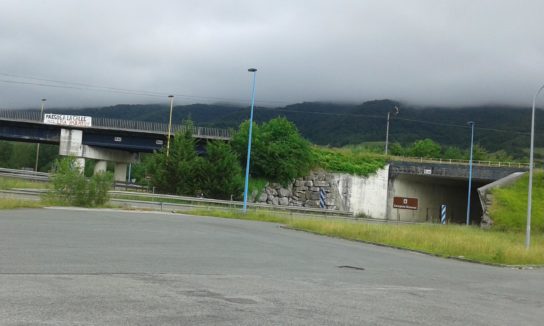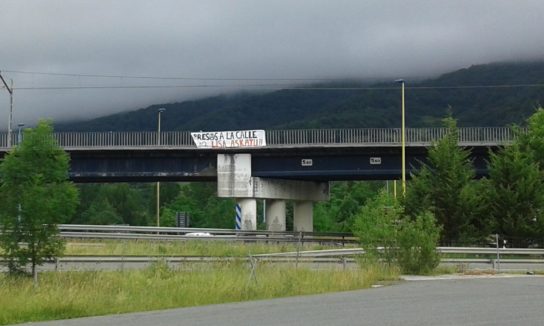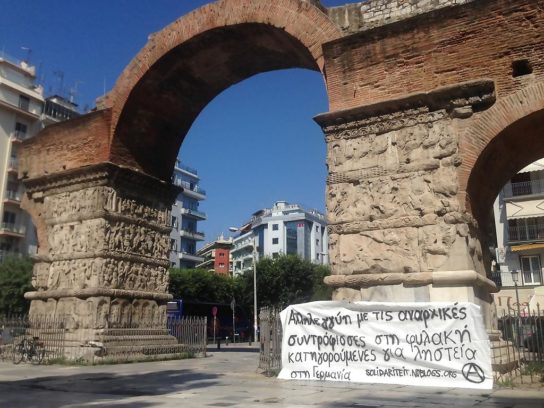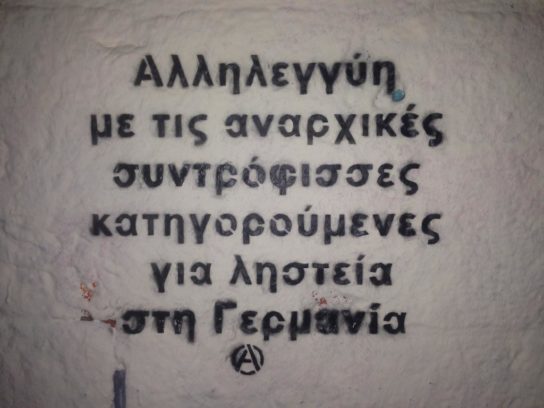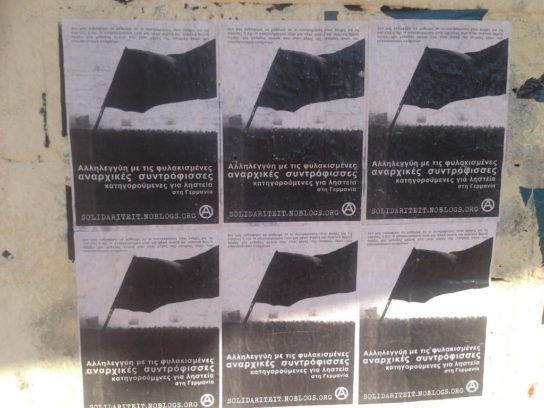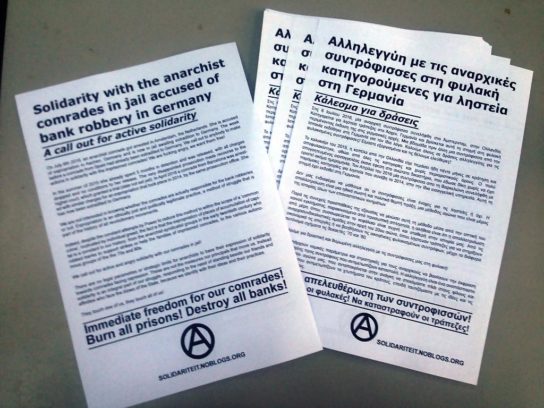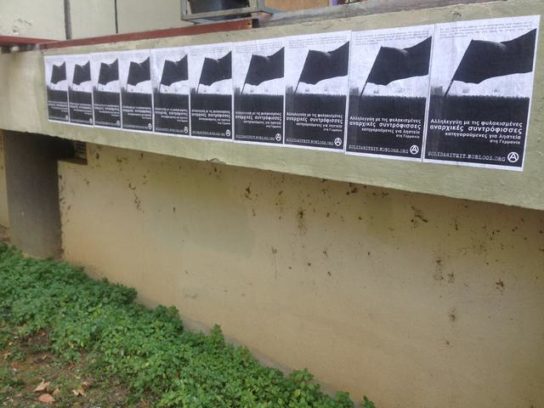Mit einem kurzen Pressebericht, veröffentlicht durch die Mossos d’Esquadra wurde am 13. April jene Polizeioperation [1] kundgetan, während der in Barcelona eine Gefährtin verhaftet wurde, die sich zur Zeit in einem Knast in Köln (Deutschland) befindet, angeklagt ein Bankinstitut in Aachen enteignet zu haben.
Laut diesem Bericht war diese Operation die Folge der Ausführung eines Internationalen Haftbefehls, ausgestellt durch die Staatsanwaltschaft Aachen, die zwei Tage zuvor den Haftbefehl auf den Namen der Anarchistin aus Barcelona unterschrieben hatte. Was der Bericht nicht erklärt und was bis heute nicht veröffentlicht wurde, ist die Tatsache, dass die Verhaftung und die Durchsuchungen in den Vierteln Gràcia und Carmel nicht nur die Durchführung eines internationalen Haftbefehls bedeuteten, sondern den Höhepunkt einer langen und engen Kooperation zwischen den Polizei- und Justizapparaten des deutschen und des spanischen Staates unter Teilnahme der autonomen katalanischen Polizei. Die Einbeziehung der Mossos d’Esquadra in diesen Fall begann bereits viel früher als April und ging, wie sich herausstellte, weit über eine einfache und rein ausführende Rolle hinaus.
Ein normaler Morgen in Aachen
Am Morgen des 14. November 2014 betritt eine Gruppe von bewaffneten Personen die Filiale der Pax Bank im westfälischen Ort Aachen, im Westen des Landes. Nach dem Leeren des Tresors und dem Fesseln der Angestellten der Bank, wird die Filiale, ohne Verletzte oder persönliche Schäden zu hinterlassen, verlassen. In den darauffolgenden Tagen verknüpft die mit der Untersuchung beauftragte Polizeibehörde, das Landeskriminalamt von Nordrhein-Westfalen (LKA NRW), diese Bankenteignung mit zwei anderen Überfällen, die in den Jahren zuvor in der gleichen Stadt stattgefunden hatten [2] und setzt eine ernsthafte – und erfolglose – mediale Kampagne der Denunziation in Bewegung, veröffentlicht die Details der Überfälle und bietet Belohnungen von tausenden Euros für jene an, die irgendwelche Informationen zu den fluchtverdächtigen Personen geben können. Das LKA ging sogar so weit mit dieser Strategie, dass es entschied für seine Kampagne ein berühmtes und erbärmliches Fernsehprogramm zu verwenden, das auf allen wichtigen Kanälen des Landes ausgestrahlt wird: Aktenzeichen XY… Ungelöst. Es handelt sich um eine Reality Show, der offensichtlich para-polizeilichen Art, bei der in morbider Art und Weise Fälle preisgegeben werden, welche die Polizei unfähig war selbst zu schließen. In diesem Programm wurden Bilder der Sicherheitskameras, am „Tatort“ gefundene Kleidung, Phantombilder und dramatisierte Rekonstruktionen des Sachverhalts gezeigt, um die zuschauende Masse zu beeindrucken und anzustiften, den staatlichen Behörden zu helfen und andere Personen zu denunzieren.
Die Perücke, der Handschuh und die Dose
Vier Monate nach der Aktion, im März 2015, schlägt die Untersuchung eine neue Richtung ein indem die katalanische Polizei die Bühne betritt. Diese schickt eine Nachricht als Antwort auf das Gesuch, welches das LKA im Januar auf internationalem Level gemacht und dabei die genetischen Profile, die aus den vermeintlich am Tatort gefundenen DNA-Spuren [3] gewonnen wurden, in Umlauf gebracht hatte, auf der Suche nach möglichen Übereinstimmungen in den DNA-Datenbanken anderer Staaten. Den Mossos zufolge stimmt das Profil, das aus einer Spur auf einer, nahe der Pax Bank von Aachen gefundenen, Perücke gewonnen wurde mit einem Eintrag in deren DNA-Datenbank überein, einer Spur, von einem Handschuh, der auf der Straße nach einer direkten Aktion mit politischem Charakter im Viertel von Sants in Barcelona im Juni 2009 gefunden wurde. Ab diesem Zeitpunkt beginnt eine gemeinsame Untersuchung, bei der die Polizeibehörden beider Staaten Informationen austauschen und intensive Nachforschungen innerhalb der, wie es die deutsche Presse nennt, “Besetzerbewegung der extremen Linken von Barcelona” angestellt werden. Den in den Medien durch die Staatsanwaltschaft und Polizei von Aachen dargestellten Thesen zufolge war diese der Hauptschauplatz der Untersuchung.
Im Rahmen dieser Untersuchung, immer der Version der Polizei zufolge, sammelten Beamte der Informationseinheit der Mossos Ende Juni heimlich eine leere Bierdose der beschuldigten Gefährtin auf der Straße auf. Auf dieser Bierdose konnten sie DNA-Spuren sichern, mit dem Zweck einen direkten Abgleich mit den Spuren des genetischen Materials durchzuführen, die nahe der Pax Bank nach der Enteignung gefunden worden waren. Vier Monate später, Ende Oktober, bestätigte ein Gutachten des biologischen Laboratoriums der Mossos die Übereinstimmung der beiden Proben. Dennoch dauerte es fast sechs Monate, bis am 12. April dieses Jahres ein europäischer Haftbefehl aus Aachen gegen sie ausgestellt wird und sie letztendlich am folgenden Tag in ihrer Wohnung im Viertel von Carmel verhaftet wird.
Repression und soziale Kontrolle: die DNA der Staaten
Das Polizeiverfahren, das in die Verhaftung der Gefährtin mündete, bestätigt uns also das, was viele schon vermuteten, nämlich, dass die Mossos d’Esquadra seit Jahren massiv und systematisch biologische Proben sammeln, während Aktionen, Demonstrationen, Durchsuchungen und Protesten, zur Anfertigung einer genetischen Datenbank, um die Kontrolle über die antagonistischen Bewegungen zu erhöhen. Was ursprünglich als außerordentliche Maßnahme eingeführt wurde, argumentiert mit der Notwendigkeit sich gegen Wiederholungstäter und wiederholende Fälle zu schützen, wird als weitere repressive Technologie implementiert und normalisiert, zur Verfolgung von politisch kämpfenden Personen.
Im spanischen Staat ist dieser modus operandi seit langer Zeit üblich, erprobt durch die autonome baskische Polizei (Ertzaintza) in der Repression gegen die baskische Linke und die Kämpfe in Euskal Herria. Wie die Zeitung Gara bereits im Jahr 2007 anprangert [4], begann die Ertzaintza auf Anhieb genetische Datenbanken durch das Sammeln von Zigarettenstummeln und Gläsern während den Festen, Zahnbürsten bei Durchsuchungen, oder Plastikmundstücken bei falschen Alkoholkontrollen anzulegen. Die Probleme der Zuverlässigkeit und Beweisgültigkeit, die diesen Methoden durch Experten auf dem Feld von DNA-Techniken zugeschrieben werden, hielt die autonome baskische Polizei nicht davon ab Gerichtsprozesse, basierend auf genetischen Profilen als einzigem Beweis, zu beginnen. Prozesse, die mit der unschätzbaren Hilfe der Außerordentlichen Gerichte der spanischen Audiència Nacional oft in langen Haftstrafen für die Angeklagten endeten.
Auf europäischem Niveau hat die Verwendung von genetischen Technologien im polizeilichen und gerichtlichen Umfeld nicht aufgehört an Boden zu gewinnen, seit Interpol Ende der 80er Jahre die Strategie der Vereinigten Staaten importierte, Datenbanken anzulegen zur Identifizierung von Personen durch ein genetisches Profil. Trotz den örtlichen Unterschieden in Bezug auf den soziopolitischen und juridischen Kontext, ist die Tendenz auf internationalem Niveau der exponentielle Zuwachs der, in diesen Datenbanken verzeichneten, persönlichen Informationen und die fortschreitende Eliminierung der gesetzlichen Beschränkungen, welche die Einführung und Verarbeitung von neuen Proben limitieren. Die polizeiliche Verwendung der genetischen Technologien ist überall in der europäischen Union drastisch angestiegen und die Kriterien für die Zulassung ihrer Anwendung werden immer lockerer. Wir finden uns deshalb in einem ungemeinen, qualitativen Sprung wieder, nicht nur in Bezug auf die repressiven Methoden, abzielend auf Bereiche minoritärer Dissidenten, sondern auch in Bezug auf die Fähigkeit der Staaten die gesamte Bevölkerung ganz allgemein einer sozialen Kontrolle zu unterwerfen. Vor dieser Herausforderung müssen die Feinde des status quo wählen zwischen uns einschüchtern lassen durch die Kontrollmechanismen der Macht oder geeignete politische und praktische Strategien zu entwickeln, um diese zu bekämpfen, wissend, dass die Hypothese einer vollkommen kontrollierten Gesellschaft nur das ist; die dunkle undenkbare Phantasie einer Logik der Beherrschung, die immer Widerstand finden wird.
Fußnoten:
[1] https://directa.cat/loperacio-dels-mossos-finalitza-amb-una-detencio-dot… (Katalanisch)
[2] Vergessen wir nicht, dass vor kurzem eine Gefährtin in Amsterdam wiederum verhaftete wurde, die beschuldigt wird an einer dieser Enteignungen – konkret jener, die im Juli 2013 statt gefunden hat – teilgenommen zu haben. Die verhaftete Gefährtin wurde am 15. Juli in Abwartung des Prozesses über ihre Auslieferung nach Deutschland am 1. September 2016 wieder freigelassen. Mehr Infos unter solidariteit.noblogs.org
[3] Die Desoxyribonukleinsäure (DNA) ist ein chemischer Bestandteil der Nuklearzelle, welcher die genetische Information enthält, die durch Erbgang in den lebenden Organismus übertragen wird. Diese Säure kommt in allen tierischen Zellen – menschlich oder nicht –, Pflanzen und anderen Organismen vor, außer in den roten Blutkörperchen. Die DNA wird bei verschiedenen Methoden (Biogenetik, Nanotechnologie, Bioinformatik etc.) angewandt, jene die uns jedoch in diesem Text interessiert ist die berühmte «forensische», die in polizeilichen, juridischen und strafrechtlichen Zusammenhängen verwendet wird. In diesen Fällen wird die DNA verwendet, die aus der Haut, dem Speichel oder dem Blut extrahiert wird, mit dem Ergebnis, dass sich daraus der genetische Fingerabdruck oder das «DNA-Profil» gewinnen lässt. Die Variationen der Sequenz dieses Fingerabdrucks oder Profils erlauben es Personen zu unterscheiden, als ob es sich um einen „menschlichen Barcode handelt“.
[4] http://gara.naiz.eus/paperezkoa/20070319/8895/es/Analisis/ADN/para/dicta… (Spanisch)

